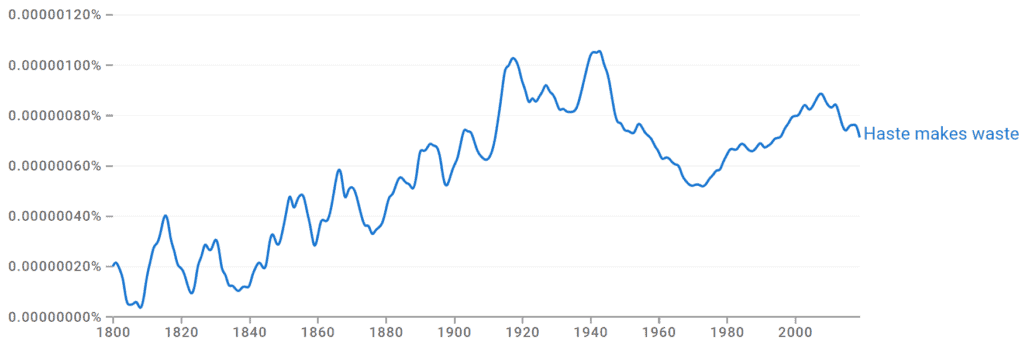Proverbs are short sayings that provide the audience with a general truth or a good piece of advice. They are often threaded within historical texts and are passed down through centuries of use without changing their meaning.
Haste makes waste is a perfect example of a proverb that has existed for thousands of years. First recorded in 190 BC, it is likely even older than that and is still used today. Let’s take a closer look at its origins and meaning so you can use it in a modern context.
What Is the Meaning of Haste Makes Waste?

Haste makes waste means rushing into action without thinking it through. When one rushes something, the results are often not favorable and end up costing more time and money than if one had taken the time to think things through beforehand.
For example:
- Although she had tried to teach her children that haste makes waste, she felt the message kept falling short because the wreck left behind after their cleaning frenzy was almost worse than what it had looked like before.
- Proving that haste makes waste, Mr. Beverage had to reassign the entire welding project due to rushed welds and poor seam work that easily broke apart.
- I should have listened to my grandpa when he told me haste makes waste because I rushed to unload the cattle feed and caught the bag on the tractor hook, spilling the grain and wasting over an hour cleaning up.
Origins of Haste Makes Waste

Variations of the expression, haste makes waste, have been used for centuries, with the first use of the sentiment appearing in 190 BC in the apocryphal Book of Wisdom written by Jesus Ben Sirach:
“There is one that toileth and laboureth, and maketh haste, and is so much the more behind.”
Geoffrey Chaucer used his own variation of the term in 1387 in the Canterbury Tales, inferring the lack of profit haste creates:
“In wikked haste is not profit.”
The modern use of the proverb made its way into the English language during the 16th century:
“Haste maketh waste” is found in the 1542 translation of Apophthegmes by Erasmus of Rotterdam. The translator, Nicholas Udall, remarked on the phrase as being a rhyming variant of the saying, “more haste, less speed.”
John Heywood’s glossary, “A Dialogue conteinyng the nomber in effect of all the prouerbes in the Englishe tongue,” published in 1546, again uses the modern expression:
“Som thyngs that prouoke yong men to wed in haste.
Show after weddyng that haste maketh waste.”
Let’s Review
Haste makes waste is a proverb that means hasty or quick action often results in a waste of time, effort or even money. It is much better to avoid rushing decisions or tasks to avoid mistakes that may end up being costly. In short, the lesson of the proverb is to first think things through or have a plan in place before action to avoid problems.
Enjoyed reading about this proverb? Check out some others we covered:
